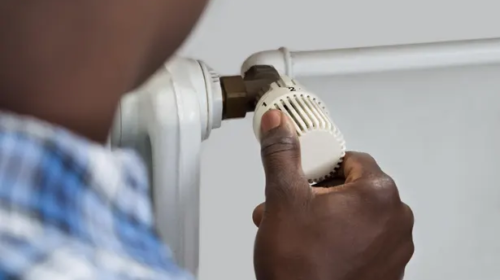The UK could eliminate all need for imports of Russian gas this year through a combination of energy efficiency, expanding renewable power generation and a campaign to help people change their behaviour, research has found.
Information campaigns played a strong role in changing people’s behaviour during the Covid-19 pandemic. Many people are unaware of the savings they could make in energy use through small changes that make no difference to their comfort but can cut bills substantially.
For instance, turning down thermostats slightly and adjusting the “flow” temperature on condensing boilers could reduce annual heating bills by more than 15%. The flow temperature governs the heat of water sent to radiators but does not reduce the room temperature, and turning it down could save up to 8% of annual costs, while turning down thermostats could save about 10%.
Advertisement
A comfortable room temperature is 18C to 21C, but many people set their thermostats at 22C or above.
These measures, along with better insulation, switching to heat pumps and using more energy efficient appliances, could cut imports of Russian gas to the UK by 80% this year and save about £150 on the average household bill, according to the green thinktank E3G. The remaining 20% could be eliminated by generating more power from renewable sources, such as new windfarms and solar panels.
Colm Britchfield, researcher at E3G and co-author of the report, said: “With government support, ordinary UK households can play a huge role in cutting Putin out of our energy system.”
The shift can be accomplished using existing policies and mechanisms, if they were pursued more thoroughly, the research found. For example, four government initiatives that currently help insulate houses and public buildings – the local authority delivery scheme, home upgrade grant and public sector and social housing decarbonisation funds – are expected to be worth about £3.4bn from 2022 to 2025.
Soaring gas prices are a cost of Russia’s war – and Britain can’t avoid them
Read more
E3G suggests that if the local authority delivery scheme alone – which supports the installation of heat pumps and energy efficiency measures for low-income households – was boosted by £1.8bn, it could cover 120,000 to 180,000 of the UK’s coldest homes.
E3G’s researchers only looked at gas use, but any public information campaign could also target petrol and diesel use, as better driving habits can make a substantial difference to fuel costs.
Russia is a minor supplier of gas to the UK, making up only about 3% of the market, as most of Britain’s supply comes from the North Sea and Norway, but reducing imports could help with the global effort to put pressure on Vladimir Putin. Cutting gas use would also ease the cost of living crisis amid soaring fossil fuel prices.
Advertisement
The government is working on the final details of a new energy security strategy, to be unveiled soon, that will boost renewable energy generation and could make planning permission for windfarms easier to obtain. Separately, the chancellor, Rishi Sunak, will set out measures to ease the cost of living in a spring statement next Wednesday.
On Monday, a group of 33 charities, thinktanks and civil society groups wrote to Boris Johnson, Sunak and the business secretary, Kwasi Kwarteng, to call for £3.6bn for insulation grants for all households, and an extra £4bn by 2025 to install heat pumps in place of gas boilers.
A government spokesperson said: “We recognise people are facing pressures with the cost of living – which is why we’re providing support with the cost of living worth over £21bn across this financial year and next including a £150 council tax rebate from April and a further £200 energy bill discount in October to cut energy bills quickly.
“There will continue to be ongoing demand for oil and gas over the coming decades while we transition to low carbon energy. We will continue to explore all options to maintain security of supply during this transition and will shortly set out our energy security strategy to supercharge our renewable energy and nuclear capacity as well as supporting our North Sea oil and gas industry.”
Pedro Guertler, programme leader at E3G, said: “The UK government must act now to permanently convert fossil gas dependency and profits into reduced living costs for all. The government has the tools to make big gains on security through energy efficiency measures for households this year. We must seize the opportunity at the spring statement.”
… we have a small favour to ask. Millions are turning to the Guardian for open, independent, quality news every day, and readers in 180 countries around the world now support us financially.
We believe everyone deserves access to information that’s grounded in science and truth, and analysis rooted in authority and integrity. That’s why we made a different choice: to keep our reporting open for all readers, regardless of where they live or what they can afford to pay. This means more people can be better informed, united, and inspired to take meaningful action.
In these perilous times, a truth-seeking global news organisation like the Guardian is essential. We have no shareholders or billionaire owner, meaning our journalism is free from commercial and political influence – this makes us different. When it’s never been more important, our independence allows us to fearlessly investigate, challenge and expose those in power. Support the Guardian from as little as $1 – it only takes a minute. If you can, please consider supporting us with a regular amount each month. Thank you.






